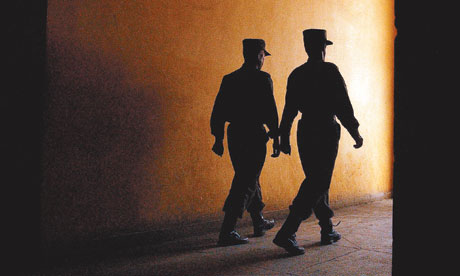- guardian.co.uk,
Monday 7 February 2011 17.43 GMT
- Article history

An inquest into the deaths of five servicemen shot dead in Helmand by a rogue local police officer is to hear evidence that the gunman and his colleagues frequently took drugs as they worked alongside British forces.
The inquest will also hear concerns that members of the Afghan National police (ANP) being mentored by British soldiers were often ill-disciplined and sometimes refused to co-operate.
It will look at how the mentoring scheme between British soldiers and local police officers in Helmand operated and examine if there was a failure by the UK government to keep the men safe.
The five men, Warrant Officer Class 1 Darren Chant, Sergeant Matthew Telford and Guardsman James Major, all of the 1st Battalion Grenadier Guards, died alongside Corporal Steven Boote and Corporal Nicholas Webster-Smith from the Royal Military police on 3 November 2009.
Today's review in Trowbridge, Wiltshire, heard that the men were sitting on steps at a checkpoint code named Blue 25, in the Nad-e-Ali district, when they were killed. They were "relaxing in the sun" at the time and were not wearing body armour or carrying weapons.
It was decided at the review that issues to be covered during the full inquest will include what was known about the attitude of members of the ANP to the British forces and intelligence about whether extremists had infiltrated the police. It will also look at how the attacker, identified only as Gulbuddin, ended up working with British troops.
The review heard that there was no evidence the attack was "drug-induced", but the assailant was a cannabis-user.
Wiltshire and Swindon coroner, David Ridley, said there was a "cultural difference" between British troops and local forces and compared the use of cannabis and opium by Afghan forces to their British counterparts smoking cigarettes.
Paul Kilcoyne, who is representing two of the families of the men who were killed, said: "You're dealing with a situation where British forces are placed in juxtaposition with Afghan nationals."
Kilcoyne said the police officers were not having the "occasional puff" – there were occasions when they "couldn't walk straight … These are people with weapons."
One soldier who is due to give evidence at the inquest has said that the Afghan police officers could "come and go as they pleased". Sometimes they did not turn up at all and refused to carry out some patrols. At times they refused to talk with their British mentors.
It emerged during the pre-inquest hearing that an interpreter had claimed to have heard a second weapon being used in the attack, but witnesses insist that there was only one gunman.
Concern was also expressed by the family of Major about the length of time it had taken for medics to get to him – about 20 minutes.
The full inquest is due to take place in April or May.

No comments:
Post a Comment